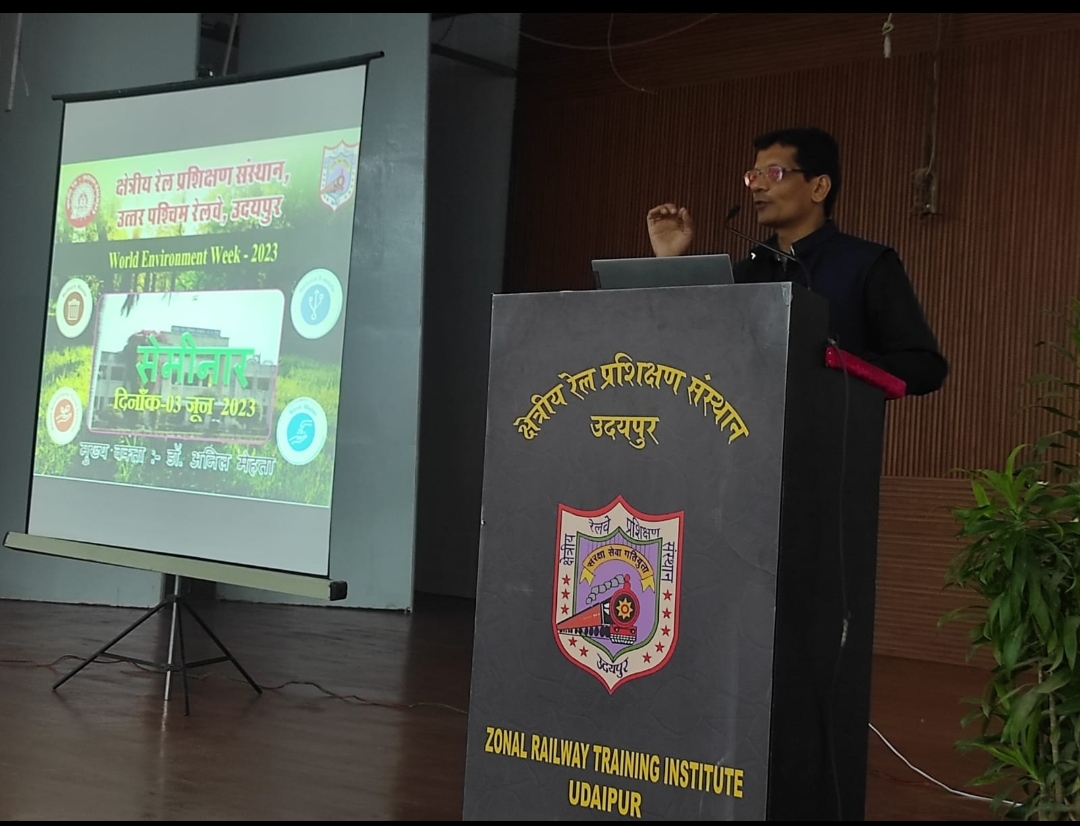
Udaipur | A person is immersing eleven grams of plastic waste every day while eating about five grams of plastic per week, soil, water, crops, and milk are all polluted with plastic; personal efforts and environment-friendly lifestyle (Lifestyle for Environment ) will reduce the waste of plastic polythene in nature
Dr Anil Mehta, Principal Environmentalist, Vidya Bhavan Polytechnic, expressed this idea while addressing one thousand railway trainee personnel from all over the country in the Railway Training Auditorium.
Maitreyi Charan, Director of the Institute, Indian Railway Service, urged to adopt measures of water conservation, energy conservation and biodiversity conservation in personal and social life.
Mehta said that the essential components of polythene and plastic are petroleum products. To make them flexible, stretchable, durable, robust, transparent or coloured and to improve their overall performance, they are soft, smooth and heavy. Many organic and inorganic chemicals are added during polythene manufacturing to develop similar characteristics (functional properties), not broken. These include many toxic substances, including phthalates, cadmium, cobalt, chromium, lead, and B.P.AB.P.A.
Mehta said that although plastic and polythene do not decompose biologically, it is photodegradable; due to sun rays, heat and other environmental factors, it deteriorates in a harmful form. The toxic chemicals in it melt (leach) and go into the soil and water. Let's go. Poisonous chemicals and microplastic-nano plastic particles of polythene immersed in the open destroy the soil's fundamental nature, including the soil's fertility structure, the flow of nutrients, and the number and activity of beneficial soil bacteria. The roots of the plants absorb these toxic elements and particles. This is why, from cereals to fruits and vegetables, there is no contamination of polythene chemicals and microplastics in them. Animals eat them when immersed in the open. Those who make animals sick, the food items obtained from them are seriously contaminated. From this point of view, both non-vegetarian and non-vegetarian vegetable and meat foods have become poisonous. There is polythene contamination from cow's milk to pregnant women's milk. Water sources - wells, step wells, tube wells, puddles, ponds, rivers, toxic chemicals, and microplastic particles of polythene pollute the water. Due to this, the quantity of polythene chemicals in fishes, other aquatic animals, and vegetation is increasing to a dangerous level.
Mehta said that microplastic particles are getting accumulated in our bodies. It is not only the cause of carcinogenic and brain diseases for the liver, kidney, and stomach; mainly, its side effects fall on the reproductive system of men and women, the endocrine gland, and the nervous system. Are. These toxic chemicals are estrogen-active and endocrine disruptors. It affects the natural hormonal system of our body. As a result, impotence, infertility, deformity in genitals, breast, uterus and prostate cancer, early menstruation in girls, hyperactivity and female-like symptoms in teenagers, and thyroid-related and diabetes diseases have become common. Microplastics and nano plastics also enter the body through our breath, causing respiratory diseases.
Not only this, carbon dioxide, carbon monoxide, methane, and ethylene from polythene plastic immersed in the open
When polyethene burns at garbage sites and other waste, many toxic gases, including furan and dioxin, are formed, increasing the intensity of all the diseases mentioned above. Many poisonous gases, including propane, are released. This further aggravates the climate change crisis and is harmful to human health.
These poisonous gases also cause serious harm to plants and trees. Polythene accumulates in open drains and sewers and obstructs the flow.
Mehta said that the simple solution to all these problems, which are dangerous for nature, including human society, flora and fauna, is to reduce polythene waste. Make "Ecobrick" by keeping polythene waste in a bottle. And then some creative, productive (productive) use of this eco brick. Ecobrick can be used in walls, pavements, pots, garbage containers, furniture for road construction and furnaces for cement manufacturing plants. The road made of plastic is more robust and more durable.